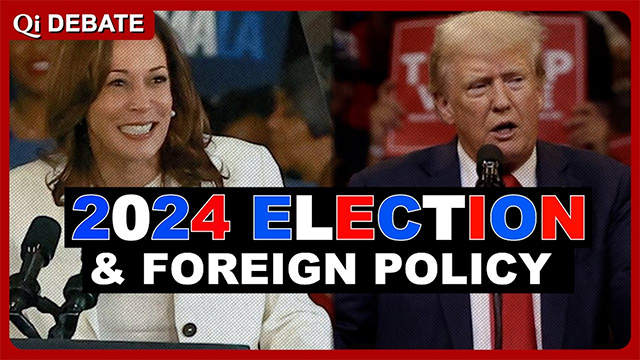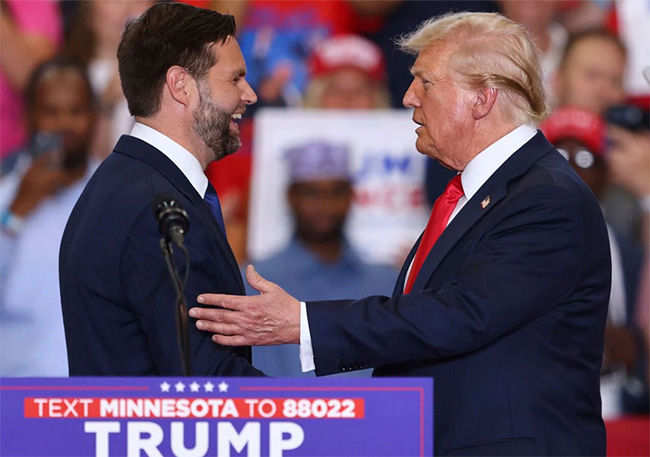
What will US foreign policy be under the new administration - either Trump's or Harris'? This question is increasingly being discussed in the international press.
For much of his time in office, President Joe Biden framed the central challenge of our age as a struggle between “democracy and autocracy.” But along the way, the light of Biden’s pro-democracy fire has dimmed — and neither candidate in next week’s presidential election appears set to stoke the flames, notes ‘The Washington Post’.
In the past year, the war in Gaza that followed militant group Hamas’s Oct. 7, 2023, strike on Israel has reshaped Biden’s legacy. The shocking Palestinian death toll and the ongoing devastation of the Palestinian territory have fueled criticism of the United States’ ironclad support of Israel’s war effort.
Outside the West, it led to mounting cynicism over Washington’s insistence on being the custodian of an international “liberal order.” Rights groups have documented alleged Israeli war crimes and even internal assessments by U.S. agencies concluded that Israel had stymied the flow of humanitarian aid to civilians. Yet the United States has not enforced its own laws to condition military support to Israel.
Harris and Trump indicate they would take different approaches to the Middle East — Trump has complained that Biden put too many restraints on Israel and, during his presidency, allied himself to Israel’s far right — but both would work to enlist a clutch of Arab autocracies to help forge a peace that eluded successive U.S. administrations. More than a decade after the upheavals of the Arab Spring, democracy has slid from the agenda.
Biden once framed the successful defense of Ukraine as a rejection of a world “where might makes right.” But by next year, the grim reality of the conflict may yield a scenario where Russia largely gets its way. Kyiv’s forces are desperately trying to hold the line in the country’s east but are losing ground in some areas. Visions of an absolute victory are fading. Western support is also sagging. “Western industry cannot produce anything like the number of artillery shells Ukraine needs,” analyst Anatol Lieven noted. “The U.S. cannot provide sufficient air defense systems to Israel and Ukraine and keep enough for a possible war with China. And above all, NATO cannot manufacture more soldiers for Ukraine.”
Harris is a more traditional liberal internationalist, but her administration might also feel compelled to strike a humbler pose. She would have to work with nationalist politicians consolidating power in Europe, where ascendant illiberalism could refashion the principles of the European Union. U.S. lawmakers are also aware that American voters in general are no longer keen on their country overasserting itself on the world stage.
 The Trump-Vance candidacy will seriously affect the Global Order.
The Trump-Vance candidacy will seriously affect the Global Order.
Here is an opinion of Professor Harsh V. Pant, a vice-president ‘Studies and Foreign Policy at Observer Research Foundation’, New Delhi, and a Professor of International Relations with King's India Institute at King’s College London.
More strikingly, he also laid out a vision of a Trump-Vance foreign policy that is striking in the way it positions the Republican external engagement far away from the traditional centre ground of American politics. Both Trump and Vance have articulated a foreign policy landscape that is causing ripples across the world. They’ve infused US politics with an isolationist streak. It’s a warning to a world that depends heavily on America for security.
The most significant aspect of a Trump-Vance foreign policy is likely to be an even closer scrutiny of China. In his four years in office, Trump succeeded in re-configuring the contours of American policy toward Beijing despite his occasional displays of a liking for China’s leader Xi Jinping. It resulted in a tech and trade war with China, but more significantly forced the world to recognize the costs of allowing China to grow at the expense of others. A broader Western re-appraisal followed, leading to a rapid shift in the global consensus.
Trump’s successor Joe Biden also agreed with the Trump assessment, and, after initial criticism, ended up not only keeping but expanding the US tariffs placed on a range of Chinese goods. For the Biden administration, the centrality of China in the US foreign policy matrix cannot be overestimated, though the security architecture it has tried to create is in partnership with allies.
With Trump appearing to inch closer to the White House, Beijing’s concerns are evident and it has been underlining that it remains “opposed to making China an issue in US elections.”
But tensions in Trump’s China policy are also evident. Where Biden has been steadfast in his support for Taiwan, Trump has argued that Taiwan “should pay [the US] for defence,” and has also suggested that the US would struggle to defend the island because of distance, saying “Taiwan is 9,500 miles away. It’s 68 miles away from China.” At the same time, Vance, Trump’s vice-presidential candidate has suggested that the supply of weapons to Ukraine by the US could prevent its ability to support Taiwan in the event of an attack by China.
The broader logic of the Trump-Vance position flows from the argument that ending the war in Ukraine is important in order for the US to focus its energies on China, which is the real threat. Vance has been very critical of US aid to Ukraine and has pushed for negotiations with Russia, going to the extent of saying that “I don’t really care what happens to Ukraine one way or another.”
Both Trump and Vance have been targeting Europe for not spending enough on defence. At the convention, Vance couldn’t have been clearer: “Together, we will make sure our allies share in the burden of securing world peace. No more free rides for nations that betray the generosity of the American taxpayer.”
This transactional approach to partnerships is going to drive the Trump-Vance foreign policy in ways that remain as unpredictable as disconcerting to some. In his speech, Vance tried to clarify that he did not believe the US should pull out of the North Atlantic Treaty Organization (Nato) or “abandon Europe,” but that Washington should “pivot” toward Asia. “The United States has to focus more on East Asia,” he said. “That is going to be the future of American foreign policy for the next 40 years, and Europe has to wake up to that fact.” There is a lot of merit in this assessment, but it also requires a more coherent and holistic approach than what is on offer at the moment from the Trump-Vance ticket.
The isolationist streak now dominating American body politic is a warning to the rest of the world that has become far too dependent on the US as the key guarantor of global security. Even if Trump doesn’t win a second term in the White House, his candidacy is reflective of deeper trends that are shaping American politics today and will have a great bearing on the complexion of the global order in the future.
read more in our Telegram-channel https://t.me/The_International_Affairs

 11:44 31.10.2024 •
11:44 31.10.2024 •






















